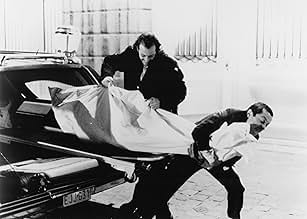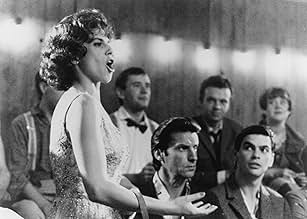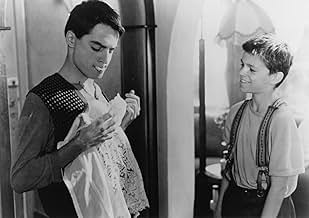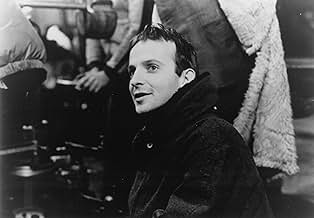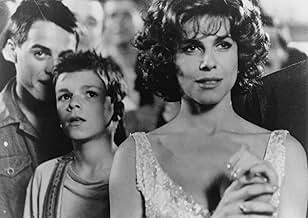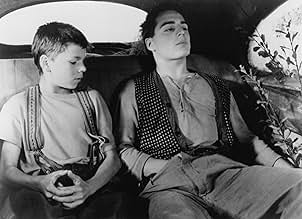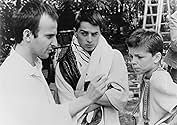Crazy Love
- 1987
- 1h 30m
ÉVALUATION IMDb
6,7/10
1,5 k
MA NOTE
Ajouter une intrigue dans votre langueHarry Voss' life spans three pivotal days: his carefree youth, high school graduation, and lonely middle age, exploring life's fleeting moments and unfulfilled dreams.Harry Voss' life spans three pivotal days: his carefree youth, high school graduation, and lonely middle age, exploring life's fleeting moments and unfulfilled dreams.Harry Voss' life spans three pivotal days: his carefree youth, high school graduation, and lonely middle age, exploring life's fleeting moments and unfulfilled dreams.
- Prix
- 7 victoires au total
Stanley Duchateau
- Théo
- (as Stan Duchateau)
- …
Histoire
Le saviez-vous
- AnecdotesRegarded by Charles Bukowski as the most successful effort to bring his work to the screen.
- ConnexionsReferenced in Titane (2021)
Commentaire en vedette
LOVE IS A DOG FROM HELL (a.k.a CRAZY LOVE) (Dominique Deruddere - Belgium 1987).
Three Bukowskian tales set in a Belgian, mostly rural, setting. How about that? Despite good reviews upon its release, winning several awards and getting support by Hollywood heavyweights Sean Penn and Francis For Coppola, the film vanished into obscurity almost immediately after its release. Perhaps it was bad timing, because Barbet Schroeder's star-studded BARFLY was released almost simultaneously. Who knows? By any chance, this film is a beauty, clearly deserving wider attention.
The film has a three-act construction, all set around the live of Harry Voss, focusing on his difficult search for love and affection. The first act is set in 1955 and follows Harry when he's twelve years old. He is struck by his first notions of true love when he sees a dream-like film in cinema, only to be helped out of his dream by a more mature friend who claims the only reason people get married is to get laid. Remember, it's fifties' rural Flanders we're talking here. In the second act, in the early sixties, Harry is a shy 19-year old, his face horribly disfigured by a grotesque form of acne. When driving in the bus, he is stared at by all the children, while the adults look away. There's a high school dance, but Harry can't get a girl. In the third act we get a more literal adaptation of Bukowsky's THE COPULATING MERMAID OF VENICE, CA., when Harry is a down-on-his-luck alcoholic, devoid of any aspirations, spending most of his time in shady bars. When he meets an old acquaintance, they go on a joined drinking binch and rehash old memories while patrolling the foggy streets. In their drunken frenzy ("for old time's sake") they decide to steal a body from an ambulance they see on a deserted street and take it to an abandoned house. This makes - how morbid it may sound - for one of the most beautiful and touching scenes of the film. The ending is a beauty.
In the first act the film starts of a bit slowly with some awkward moments. I found the second and third acts the strongest, but all three segments show remarkable cinematic harmony. Beginning and ending the film with nicely contrasted mirror images of "the Princess" running across some dimly lit corridor and Raymond van het Groenewoud's haunting musical theme, it makes for a very neat composition indeed. Cars also feature prominently in all three segments. Most of the key scenes take place in or around cars. It all a very American feel to it, especially the second act. A homecoming dance, a prom, lampoons, American cars, it's small town USA transferred to Belgium. The lead performance by Josse de Pauw who plays the adult Harry in the second and third acts, is a joy to watch.
All the more recommended, because of Mondo Macabro's excellent DVD-release. A bit of an oddity in their usual catalogue of all kinds of exploitational sewers of world cinema (which I often like, don't get me wrong), their treatment of the film is excellent, with a luminous new transfer and jam-packed with extras. Two documentaries, the "making-off" with some great footage of Bukowski and his thoughts on the film, a filmed interview with director Deruddere, a text essay on Flemish cinema, and Mondo Macabro's usual trailer reel of the wilder side of world cinema to top it all off. With an almost surrealist setting and touching subjects like necrophilia, it's not a film most audiences will embrace easily, but any fan of Bukowski, Belgian cinema or good cinema in general should really give this one a try. It might be a far cry from Bukowsky's usual settings but liberal interpretations usually make for far more interesting films. This is worth seeing. Damn, the man even approved of it himself!
Camera Obscura --- 9/10
Three Bukowskian tales set in a Belgian, mostly rural, setting. How about that? Despite good reviews upon its release, winning several awards and getting support by Hollywood heavyweights Sean Penn and Francis For Coppola, the film vanished into obscurity almost immediately after its release. Perhaps it was bad timing, because Barbet Schroeder's star-studded BARFLY was released almost simultaneously. Who knows? By any chance, this film is a beauty, clearly deserving wider attention.
The film has a three-act construction, all set around the live of Harry Voss, focusing on his difficult search for love and affection. The first act is set in 1955 and follows Harry when he's twelve years old. He is struck by his first notions of true love when he sees a dream-like film in cinema, only to be helped out of his dream by a more mature friend who claims the only reason people get married is to get laid. Remember, it's fifties' rural Flanders we're talking here. In the second act, in the early sixties, Harry is a shy 19-year old, his face horribly disfigured by a grotesque form of acne. When driving in the bus, he is stared at by all the children, while the adults look away. There's a high school dance, but Harry can't get a girl. In the third act we get a more literal adaptation of Bukowsky's THE COPULATING MERMAID OF VENICE, CA., when Harry is a down-on-his-luck alcoholic, devoid of any aspirations, spending most of his time in shady bars. When he meets an old acquaintance, they go on a joined drinking binch and rehash old memories while patrolling the foggy streets. In their drunken frenzy ("for old time's sake") they decide to steal a body from an ambulance they see on a deserted street and take it to an abandoned house. This makes - how morbid it may sound - for one of the most beautiful and touching scenes of the film. The ending is a beauty.
In the first act the film starts of a bit slowly with some awkward moments. I found the second and third acts the strongest, but all three segments show remarkable cinematic harmony. Beginning and ending the film with nicely contrasted mirror images of "the Princess" running across some dimly lit corridor and Raymond van het Groenewoud's haunting musical theme, it makes for a very neat composition indeed. Cars also feature prominently in all three segments. Most of the key scenes take place in or around cars. It all a very American feel to it, especially the second act. A homecoming dance, a prom, lampoons, American cars, it's small town USA transferred to Belgium. The lead performance by Josse de Pauw who plays the adult Harry in the second and third acts, is a joy to watch.
All the more recommended, because of Mondo Macabro's excellent DVD-release. A bit of an oddity in their usual catalogue of all kinds of exploitational sewers of world cinema (which I often like, don't get me wrong), their treatment of the film is excellent, with a luminous new transfer and jam-packed with extras. Two documentaries, the "making-off" with some great footage of Bukowski and his thoughts on the film, a filmed interview with director Deruddere, a text essay on Flemish cinema, and Mondo Macabro's usual trailer reel of the wilder side of world cinema to top it all off. With an almost surrealist setting and touching subjects like necrophilia, it's not a film most audiences will embrace easily, but any fan of Bukowski, Belgian cinema or good cinema in general should really give this one a try. It might be a far cry from Bukowsky's usual settings but liberal interpretations usually make for far more interesting films. This is worth seeing. Damn, the man even approved of it himself!
Camera Obscura --- 9/10
- Camera-Obscura
- 25 févr. 2007
- Lien permanent
Meilleurs choix
Connectez-vous pour évaluer et surveiller les recommandations personnalisées
- How long is Crazy Love?Propulsé par Alexa
Détails
- Date de sortie
- Pays d’origine
- Langues
- Aussi connu sous le nom de
- Love Is a Dog from Hell
- Lieux de tournage
- sociétés de production
- Consultez plus de crédits d'entreprise sur IMDbPro
Box-office
- Brut – États-Unis et Canada
- 119 919 $ US
- Durée1 heure 30 minutes
- Mixage
- Rapport de forme
- 1.66 : 1
Contribuer à cette page
Suggérer une modification ou ajouter du contenu manquant



